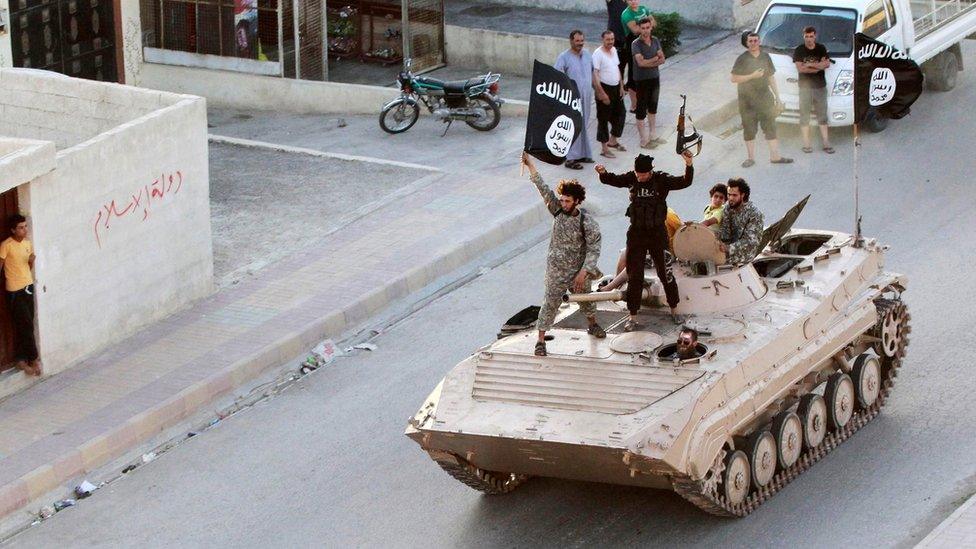Terror prosecutions of people back in UK from Syria not counted
- Published

The Islamic State group urged Muslims to migrate to their new "caliphate"
The government does not record the number of people prosecuted for terror offences after returning to the UK from Syria, an official report says.
The data is held neither "officially or unofficially", an annual review by the independent reviewer of terrorism legislation, external, Jonathan Hall QC, says.
Figures previously provided to Parliament by ministers later had to be clarified.
Mr Hall's report instead relies on BBC News research on the subject.
It is known that hundreds of people have returned to the UK after joining terrorist groups in Syria but the cumulative figure given in public is ambiguous.
Last year, the director general of MI5 said "over 950 UK-linked extremists" had travelled to Syria.
Two months earlier, a senior MI5 officer told inquests for Saskia Jones and Jack Merritt - killed by convicted terrorist Usman Khan at Fishmongers' Hall, London Bridge - about 850 had gone to the country,"around half" of whom had since returned.
On Wednesday, Mr Hall said the prison service failed to recognise the dangers Islamist gangs and convicted terrorists posed inside jail.
'Uncertainty remains'
The government has provided downwardly shifting figures on the number of returnees prosecuted for terror offences:
In 2016, it said the Crown Prosecution Service (CPS) had prosecuted 35 cases involving 54 defendants suspected of having fought in the region, with 13 ongoing prosecutions involving 30 defendants
In 2018, a Home Office minister said about 40 people had been prosecuted, either because of activities in Syria or linked to the conflict there
In 2019, the government clarified these 40 had been charged with a range of offences not limited to those covered by terrorism legislation and in some cases might not even realise they had been investigated for non-terror offences because of their engagement in terrorism
Mr Hall's report says "uncertainty remains" about the precise number of prosecutions for terrorism.
"No investigative or prosecutorial body in the United Kingdom keeps a record, either officially or unofficially, of the precise information that is needed to answer this question posed - that is the number of individuals who are known to have travelled to join Daish, Islamic State, in Iraq or Syria and who have subsequently been prosecuted on their return for terrorist offences specifically in respect of their conduct in or travel to Syria," it says.
BBC investigation
Last year, BBC News set out to answer the question, after different government agencies refused to provide the information. and Mr Hall's report relies on that research.
The research shows 10 returnees have been convicted of Islamist terror offences relating to Syria, with a further four people convicted of terror offences in relation to extremist instructional documents seized in the UK either following their original departure or after their return.
Mr Hall separately expresses concern about the "failure of the government" to secure legal aid for people placed under strict terror-restriction measures, a position he describes as "deeply unsatisfactory".
Terrorism Prevention and Investigation Measures (Tpims) allow the authorities to monitor and manage people considered terrorists but not facing criminal charges.
Subjects face measures such as wearing an electronic tag, relocation, and limits on whom they can meet and where they can go, which can be imposed for years.
The latest figures show only four people living under Tpims.
Each Tpim should be automatically reviewed by the High Court but previously some reviews have been dropped after the subjects were refused the necessary legal funding.
Last year's annual report recommended legal funding should swiftly be made available to all Tpim subjects, which the government rejected, leading - unusually - to the recommendation being made again this year.
Mr Hall also notes a "noticeable change in the Tpim cohort towards the more chaotic, neurodiverse and/or mentally unwell".
BBC News previously revealed a trend towards using the measures on radicalisers connected to the banned group al-Muhajiroun.